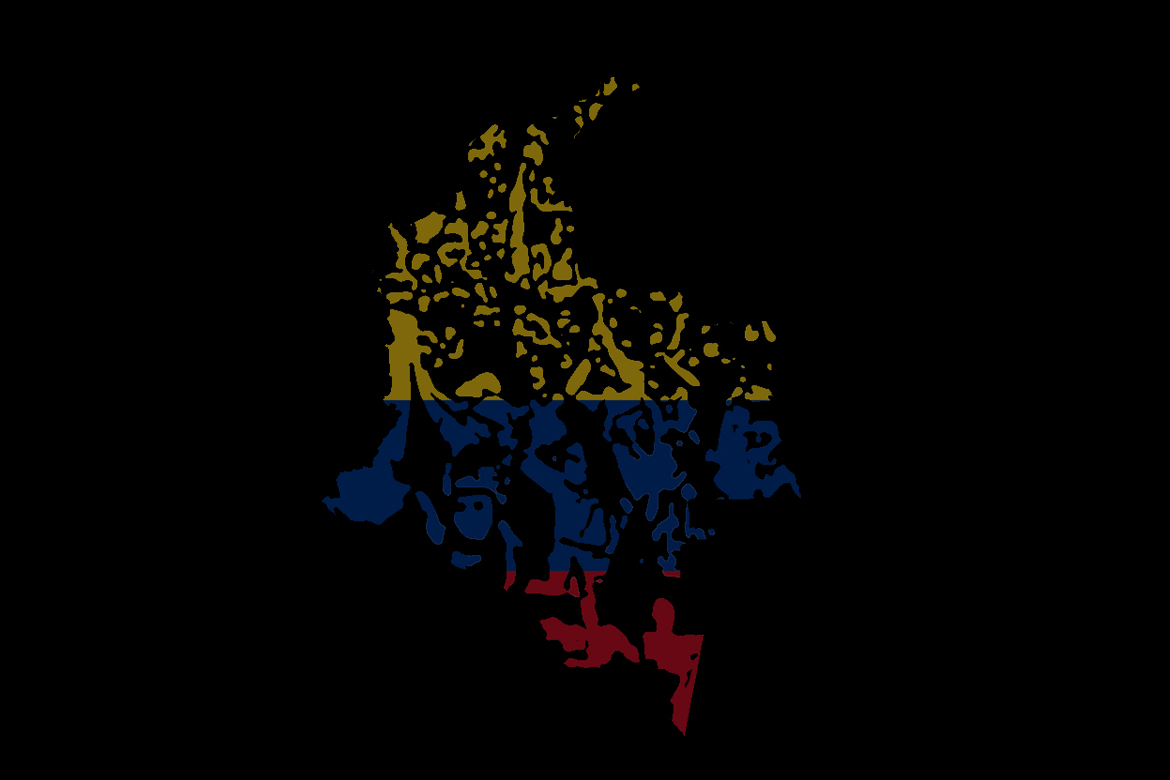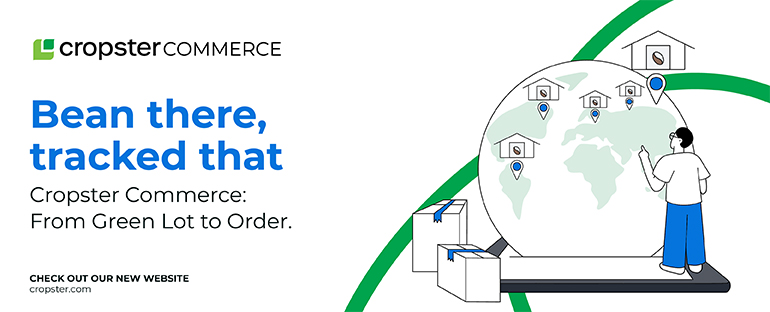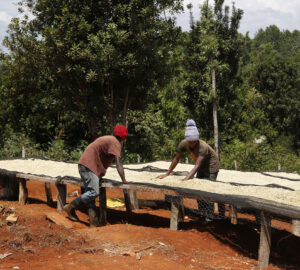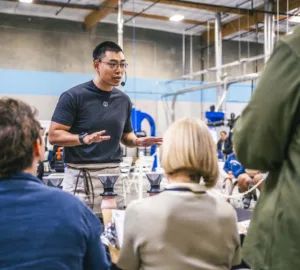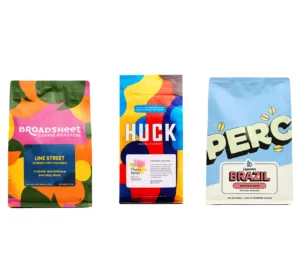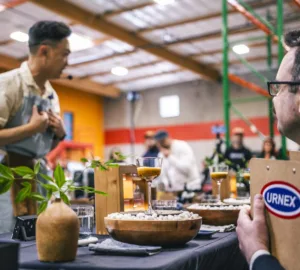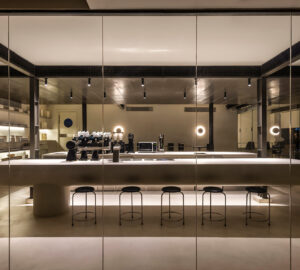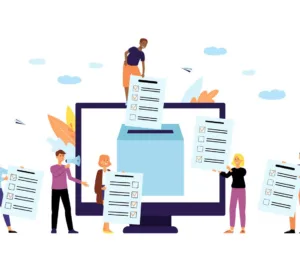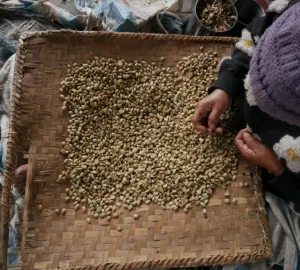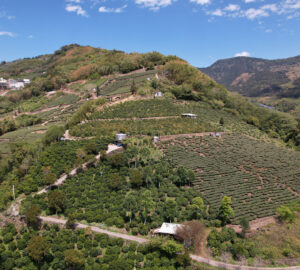Sprudge coverage continuesterday on the fast moving, truly disturbing situation in Colombia, a mounting tide of civil unrest and protest that has spilled out into the streets in major cities, and impacted communities large and small across the country. As the world wakes up to this evolving situation, what’s become undeniably true is that this is a story shot through with a coffee narrative, and not just from an export lens. Yes, Colombia is home to some of the world’s premier Arabica coffee production, and if you’re reading these words, the odds are roughly 99% you have enjoyed delicious Colombian coffee in your life. (You are perhaps drinking some right now). But what you might not know is that Colombia is home to one of the greatest coffee cultures in the world, a country of coffee lovers and cafes, daily drinkers and obsessives, farmers and producers, and cafe owners and baristas, an interlocked chain of production, consumption, and appreciation.
Western media has limitations—we are aware of this at Sprudge as both consumers of media and publishers ourselves. This is a coffee story because it’s a Colombia story, and the people who make coffee possible in Colombia has been profoundly impacted by the crisis. So to learn more about the situation, we reached out to a growing group of Colombian and Colombia-based coffee professionals—baristas, producers, cafe owners, traders, educators, individuals from every step of the coffee chain—and asked them a series of questions about the current situation in Colombia.
This is an updating feature, and as more voices and perspectives are added we’ll continue adding to the piece. Please note that Sprudge Media Network is not currently and has never been affiliated with, or in any form of advertising or promotional relationship with, the Federation Nacional de Colombia (FNC) or any other prong of the Colombian government. This allows our reporting to be independent and driven by journalism above all else.
Each of the coffee professionals interviewed took some degree of risk by speaking to us—we thank them profusely. This is an updating list of interviewees.
Cristian Raigosa Perez — @cristianraigosa — Cristian is a co-founder of three different specialty coffee projects (@cafes.renacer @lafabrica.mde @rituales.cafe) in the city of Medellin. He works as a roaster and general director of quality.
Javier Tabares — @coffeedenciales — Javier is a coffee experiences tour guide, translator, teacher and barista trainer based in Medellin.
Angie Katherine Molina Ospina — @katheos02 — Angie is the co-founder of Insignia Coffee, based in Tolima. She is a member of the Sprudge Twenty class of 2020.
Omar Herrera — @ohmarvelous — Omar is the lead green coffee buyer in Colombia for Cafe Imports. He has lived and worked in the coffeelands of Colombia off and on for the last six years, most recently in San Augustin, Huila.
Maria Paulina Pulido Zuluaga — @mpaupulidoz — Maria is a coffee teacher and barista based in Medellin.
Ana Mustafa — @anamustafa_ — Ana is an internationally recognized coffee producer based in the Risaralda department. Her family’s farm, Mustafa Estate, is a member of the La Real Expedicion Botanical. She is a 2020 Sprudgie Award nominee for Notable Coffee Producer.
Felipe Sardi — @felipesardi_ari @lapalmayeltucan — Felipe is an internationally recognized coffee producer and exporter based in the Cundinamarca department. He is a co-founder at La Plama y El Tucan, as well as working with Delagua Coffee Paradise in Sierra Nevada de Santa Marta. Felipe is a two-time Sprudgie Award nominee for Notable Coffee Producer, and member of the Sprudge Twenty class of 2020.
This interview roster is updating—check back for additional interviews. Interviews have been gently edited and condensed.
For starters, please describe the current situation where you are in Colombia.
Cristian Raigosa Perez: Thank you very much for helping us spread the word, and please excuse my English. There is a lot of chaos and uncertainty here; Medellín is one of the cities most affected by the current situation, most of the streets are empty, there are areas with continuous problems of public order, commerce is seriously battered, and in general there is a situation of uncertainty.
Javier Tabares: Colombia is in the middle of a terrible crisis. COVID-19 emergency caused a massive explosion of poverty that was accumulated during decades of state negligence. Now the president is trying to charge more taxes in a desperate move to finance some subsidy programs. But people are desperate and angry. The government wants to gather more taxes instead of cutting public expenses or charging these taxes to rich people. Protesters are not afraid to spread the virus, because they are starving, they have no jobs, they have no good education options. They are tired of claiming basic needs or rights! COVID-19 is not responsible for this, COVID-19 just revealed our deepest social inequities.
Felipe Sardi: Currently, many of the main roads around our operations have been blocked and some nearby cities and small towns have been vandalized. Unfortunately, protests have turned violent, and while many people have gathered to express their discontent with Colombia’s social, economic and political situation as a continuation of the November 2019 protests, some demonstrations have turned into violent clashes with police, causing serious harm (and even death) around the country.
Angie Katherine Molina Ospina: First of all, thank you so much for opening the space to discuss this important topic. The community needs to be updated since the information has been misrepresented and not widely spread. I am originally from Bogotá and based in Ibagué, Tolima, the central part of the country located thee hours away from Bogota (to give you some context). I have a company based in Ibagué called Insignia Coffee, a vertical model composed by my husband’s coffee farm, a coffee laboratory (where we provide physical and sensory analysis to producers who want to improve and validate their quality), roastery, and coffee shop where we promote coffee mainly from this region and work closely with other producers from different parts of the country.
Ibagué is a city with a population of 600,000 citizens with high levels of unemployment and mental health problems (people committing suicide almost every day), to mention only a few important issues. Due to the tax reform that the government was planning in the middle of a pandemic, all the economic sectors decided to protest against it as well as the majority of the cities in the country. What detonated the hate of the population not only in Ibagué but in the entire country was the extreme actions of the Police and the ESMAD (the “SWAT” police) against protestors including deaths, sexual abuse, people disappearing, and more. Despite the withdrawal of the proposed tax reform three days after the protests, in Ibagué people kept protesting due to the death of Santiago Murillo this last Saturday evening 1st of May, an innocent guy of only 19 years old who was on his way home during the protest and was shot by a policeman with no reason. The guy had to be taken in a motorbike to the nearest hospital as the police did nothing about it. This has been the case in other cities such as Cali, Pereira, Manizales, Medellin, Bogotá, and more.
Basically the violence that for more than 50 years has impacted the countryside oppressing growers for a very long time and being supported by the narcotraffic and government has now reached the main cities. Colombia is overloaded with corruption and violence at every level but the last week has shown how capable are our governors to keep their power no matter what they need to do. We need international organizations to fight for our human rights. Our main concern is the future of youth and a peaceful retirement of the elderly population. 42% of the Colombian population has reached a concerning level of poverty and the rich people keep getting richer.
Omar Herrera: Colombians are no strangers to political movements and protests, and to making their voices heard, and as a coffee buyer whose job it is to manage shipments and logistics, over the past five years this is something that’s increasingly become part of life in Colombia, especially around harvest time. But with the election of Ivan Duque, the current president, this situation has grown. The current moment kicked off a few weeks ago, when Duque introduced some post-COVID social reform aimed at raising Colombia’s GDP, and tax reform is part of that. They wanted to remove tax credits and raise taxes on people in Colombia making less than $600 a month, as well as introduce taxes on things like groceries, Netflix, coffee, eggs, things like that which had not been taxed before. In response there have been huge protests, not just in the large cities but also in smaller towns and in the coffee lands, reaching every corner of Colombia. It’s happening in very, very small places now, out in the streets, and that’s how you know the scope is growing.
Maria Paulina Pulido Zuluaga: Last month, the government issued a tax reform in which it suggested raising taxes in the midst of an economic and social crisis due to Covid-19. If approved, this reform would have meant low-income people become poorer and rich people become richer. As a result, on 28 April, the people marched peacefully against the reform. But since that day in Colombia, abuses of power have begun and the media are distorting the reality we are experiencing. The people are tired of so many lies from the government. For 10 days we have been exercising the right to march peacefully, but the president has militarised some cities and authorized them to fight the people as necessary. We have more than 30 unjust deaths, more than 800 unjust arrests, as well as approximately 10 cases of sexual abuse and many other rights violations.
Ana Mustafa: This is a severe state-lead repression against those who oppose their systematic oppression.
How has your work in coffee been impacted so far by the situation?
Cristian Raigosa Perez: Due to the public order situation the city in general is empty, which directly affects the coffee shops—not only ours but also everyone else here in the coffee industry. In turn this is reflected in our collaborative roasting center, where these days the coffee brands that are part of this ecosystem roast as needed in small quantities. All of this has been impacted: the supply of beans from other regions is stopped due to road closures, and even internally within our department it is difficult to mobilize coffee. In addition to this, on April 28, the day that the demonstrations began, a few criminals who camouflaged themselves in the demonstrations tried to vandalize and destroy the glass facade of our collaborative roasting center @lafabrica.mde
Javier Tabares: I lost my job of four years working with a tourism company. Now I’m on my own, trying to survive like everybody else. Tourism, gastronomy, entertainment, and agriculture are the most affected economic sectors in terms of joblessness. Colombia has more than 10 million workers without formal employment. This means 1/5th of the whole population has no formal job benefits and they are just surviving every day in the streets.
Felipe Sardi: Yes. Even though we’re still able to move bags with coffee cherries we buy from nearby small-scale farms into our wet mills (in both regions where we operate), transporting parchment or green coffee from our wet-mills to dry milling facilities or to ports has not been possible.
Angie Katherine Molina Ospina: My work in coffee is definitely being impacted as the Colombian peso is losing strength against the US Dollar meaning higher prices of resources to produce coffee, to buy it locally and to sell it abroad. We have been working on exporting our farm’s coffee and this price fluctuation at all levels creates speculation that affects our relations with buyers and other producers we work with. Moreover, the Colombian government is losing credibility internationally and this seriously affects commercial relationships abroad.
Maria Paulina Pulido Zuluaga: Absolutely yes. I work with vulnerable populations, including kids and teenagers who live in protection homes/foundations. For this situation it’s impossible going there to teach them, and virtual classes are very difficult as well. Every day I listen to helicopters passing through my house, explosions, tear gas shootings, and not far from here you can see this situation playing out on social media, including Whatsapp and Instagram. The kids feel scared for their futures, and that part is the most difficult, because you don’t know what to tell them or what to do. In addition, if we talk about the whole coffee production chain, absolutely everyone who works with coffee is being affected. From farms, producers, roasters and coffee shops to exporters and educators.
Ana Mustafa: My private interests as a coffee producer are not the important matter here. This is the core of the political understanding and sensibility we are all getting out from this brutal repression: there is something called public interest and it is worth fighting for. So, it does not matter if you are or not subjected to extreme poverty, we should stand against a government that only protects the interest of the few by producing and reproducing conditions of inequality for the rest. And we have to be aware that, as citizens, we have the right to protest without threatening our lives in the process. Talking about the discomfort to my privileged position in the society would be frivolous, and distract the attention of the public away from the current political situation.
Omar Herrera: In my experience here, political protests or strikes in big cities don’t tend to impact coffee regions. This time it is very different. I’ve been in San Augustin, Huila most recently, and this is a place that’s typically kind of removed from the rest of the conversation happening throughout the country, people in the coffeelands aren’t quite as tuned in to what’s happening in the cities. But now, this movement really has reached every corner of Colombia. We are seeing it in the physical blocking of trade routes and ports, where citizens come out and block the entrances to the port cities, an action that hits the country where it cares about the most. As a coffee trader we are estimating at least a three week delay in coffee shipments from ports like Buenaventura, and our colleagues we work with as exporters are working to ensure prices and payments still reach the coffee producers. But I think the delay will be much longer than three weeks.
What is something you want people reading this story in the United States or Europe to know about the current situation in Colombia? What do you think has been underreported?
Javier Tabares: State forces and government are out of control. This protest is peaceful, but every night since late April, the police are firing on citizens with no caution or mercy. They are killing civilians and the local media is denying any responsibility. This kind of behavior is not new in Colombia. The only difference now is this time this is happening on the streets instead of the typical war zones away from the cities. Now we are suffering the abuses that farmers have been suffering all these years. This time this shame has been streamed through social media platforms.
Maria Paulina Pulido Zuluaga: I want the people to read the TRUTH. We need the most help possible. Colombia in this moment needs every person from other countries to make justice. We are suffering. Most people don’t even comment on the situation out of fear or conformism. But we know if we join forces, we will can fight for a better Colombia.
Felipe Sardi: Our beloved Colombia is suffering and we must listen. Our country’s current situation was predictable and has been so for years. Its catalyst, however, was a very recent unpopular tax reform that sought to collect three times more than what the government required, starting with taxing the most basic products and millions of low and middle-income families. The social dialogue that started back in 2019 between the people and the government of Colombia was abruptly interrupted and remains unfinished.
Even worse, the government took an insensible approach towards the COVID crisis and focused not on growing the economy with necessary public spending but on increasing taxes without listening to Colombians’ concerns about economic inequality and social injustice.
As I see it today, on the one hand, we have a society that screams to be defended against violence and vandalism, and on the other hand we have a society that claims its rights and the need to be heard, to solve social differences, and address structural problems including lack of education and opportunities for a huge part of our population, especially in rural areas where we operate.
We reject violence, false information, manipulation and vandalism, but in Colombia we have the tendency to attribute all problems of public order to guerrillas and criminal groups, and today the situation is different. Despite the unfortunate and inaceptable violence behind some recent riots, the truth is that Colombia’s civil society is marching peacefully in many regions, demanding an honest and open national dialogue that will bring hope for millions.
Regarding our coffee projects, we remain committed to our purpose of supporting the small coffee-growing families that today, more than ever, need us. We see this moment as an opportunity for transformation created from peaceful action, and the kindness and passion that is inherent in the Colombian people. Only then can we generate the necessary changes that will allow us to grow as a country.
We believe in building a better country through honest and sustainable work. We believe in promoting regenerative agricultural practices. We believe in paying fair prices for each harvest. We believe in giving back to coffee producers their food sovereignty and the autonomy to live with dignity. We believe in sharing and generating added value.
Our demonstration is to get up to work for our families and to contribute to the development of the country. That is our march.
Ana Mustafa: I think we should be asking ourselves which political claims have been agglutinated by many sectors to put the current administration in an uncomfortable situation. And we should be thinking mainly on the political opportunity that is occurring. Colombia has not only been deeply impacted by State-led corruption, that erodes democratic institutions everyday, but also by political repression, massacre of social leaders, inequity and many estructural macro-economical issues. This is the first time this generation of workers, truckers, farmers, students, indigenous, afrocolombians, feminist and LGBTQ groups have uprised against the government using an unanimous voice.
Cristian Raigosa Perez: I want to contextualize for your readers. It is important to understand that the situation now in Colombia detonated due to tax reforms aimed directly at the lower and middle classes of the country, who are experiencing economic crisis due to COVID-19, with little contemplation of raising taxes on the upper classes or sectors such as banks. Taxes on coffee consumption, for example, used to be just 5%, but they wanted to increase it to 19%. But this reform proposal was only the trigger. There are many reasons why today people in Colombia are dissatisfied with the government. In the midst of the pandemic and financial crisis, for example, the state spent large sums of money on warplanes, armored vans for parliamentarians, and increases in their already very high government salaries. In addition to this, there is a health reform aimed at privatizing fracking, and they want to fill our fields with glyphosate to combat illicit crops without taking into account the serious impact on the environment and its health (this is a very political issue right now in Colombia). In recent years hundreds of social leaders have been assassinated. And there is general discontent with the current government and its political family, which has been exploiting the country for years, and has aggressively expanded our military and “war position.”
During the demonstrations, more than 30 murders (including children and older adults) have been registered by the authorities, including Police, ESMAD, and National Army. There are thousands of cases of human rights violations, disappearances, police abuse, and even sexual abuse. These are human rights violations, as defined by the United Nations. The traditional media distorts this information in Colombia and speaks little about it, and the alternative media are being censored on social networks. There are sectors of the country where the situation has worsened and where people have suffered cuts to the internet and energy services. The state has been credibly accused of infiltrating demonstrations to sow terror and chaos, as a means of delegitimizing the demonstrations and are seeking to declare what’s called Estado De Conmoción Interior—a kind of martial law, which would allow the military and police to take full control over the country, continue assassinating without any question, disabling local leaders, controlling the media, and so on.
Omar Herrera: Many people don’t realize the class system used in Colombia. You actually get assigned a number, 1-5, and it determines how much you pay for taxes, utilities, etc—you will be assigned a class number on your electrical bill, printed right on it. Minimum wage in Colombia is $260 a month, and average wages are around $350 a month. The proposed tax reforms were aimed at Colombians earning under $600 a month, removing tax credits and increasing taxes on consumer goods that had never really been taxed before. So much of what’s happening in Colombia does not reach the United States media. There has been so much police violence. It feels like everyday there’s people in the street, or on Facebook, talking about the police or military gunning down another young person. Similar to the pushback against police violence in the United States, this situation in Colombia has been brewing for a while.
Angie Katherine Molina Ospina: The great majority of our population is being affected by our government’s personal interests. For decades the government has worked to benefit only the richest families in Colombia and that doesn’t seem to change in the short term. Now the politicians making the decisions for our country are being dismantled and these violent actions during the protests are a sign that the situation is getting out of their hands so they have been asked the Police and Military force to fight against civilians, giving orders to hurt and murder, and and even acting like civilians committing acts of vandalism and violence on the streets to discredit the protestors.
The local media have their own interests and they are hiding a lot of this information that we the citizens have been reported through our social media. The situation is INSANE.
What social media accounts should we and our readers be following for updates? And are you aware of or in touch with any fundraising or community support efforts in your region? Many of our readers want to help, and we will include links and resources in this story.
Javier Tabares: Please follow these accounts:
Unfortunately I’m not aware of any kind of organization right now for mutual aid. I’m sorry. But, my advice would be to support local roasters, specialty coffee shops, or exporters based in Colombia. We need resources, yes, but beyond that, we need sustainability in the long term, and that’s possible only if we get more visibility in the market. If you are an importer, please, explore your options here and do not contact the FNC. Contact roasters or producers directly.
Cristian Raigosa Perez: In general, human rights organizations require materials for temporary health posts that care for the wounded during the demonstrations, and the independent and alternative media are those who need the most help. I will update you shortly with a list of organizations.
Maria Paulina Pulido Zuluaga: I try to publish every day information about what happens and to label influencers, big companies, and human rights in certain publications, but we need to be more to make noise. In addition to other accounts, follow these people:
Thank you for taking the time to hear us.
Omar Herrera: This is a difficult question, because I do not think there is any single group or aid organization people can support. I think it speaks to the reality of the situation across the country. People are frustrated. This started with tax reforms but at this point it’s so much more. There is no leader to this movement, no point person or single organization that unifies the movement. The government has said the same thing more or less—”We don’t know who to talk to so we aren’t going to talk to anyone.” It’s a difficult thing.
Angie Katherine Molina Ospina: If there are people interested in supporting us, I’m more than happy to be a bridge to contribute to this cause. Some accounts to consider following include:
Once again, thank you so so much for being the bridge with the international community. We need to be heard and seen.
Ana Mustafa provided the following links:
https://www.lacoladerata.co/quienes-somos/donaciones/
https://www.cric-colombia.org/portal/#
This feature is updating. Check back for additional interviews.
Jordan Michelman (@suitcasewine) is a co-founder and editor at Sprudge Media Network, and the winner of a 2020 James Beard Award for journalism. Read more Jordan Michelman on Sprudge.











